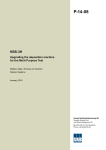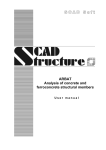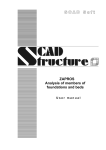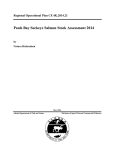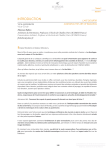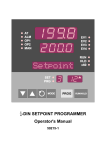Download User manual. GeoWall - GeoSoft - programs for geotechnical
Transcript
«InzhProektStroy» OOO Tel./fax: +7 342 219-61-03, 219-63-14 www.geo-soft.ru [email protected] User manual GeoWall 2.0 Calculation of sheet pile walls 2009 GeoWall Information in this document can be changed without prior notification. Any part of this document cannot be reproduced or transmitted in any form by any ways for any purposes without written agreement of “InzhProektStroy” OOO. © 2007-2009, «InzhProektStroy» OOO. With All rights reserved. 2 GeoWall CONTENT content.....................................................................................................................3 introduction..............................................................................................................4 methods of Calculation............................................................................................5 Calculation of soil pressure........................................................................ 6 Calculation of soil stability around a deepened wall part........................... 8 Calculation of longitudinal forces in anchors ........................................... 10 Task solution of elastic wall bending ....................................................... 12 Sheet pile wall strength calculation.......................................................... 14 Effective wall section characteristics ....................................................... 16 program overview..................................................................................................17 Menu ........................................................................................................ 18 Toolbar ..................................................................................................... 23 Data input panel ....................................................................................... 24 «Geology» insert ...................................................................................... 24 «Wall» insert............................................................................................. 26 Sheet pile wall section characteristics ..................................................... 29 «Slurry wall» window................................................................................ 29 «Bored pile wall» window......................................................................... 30 «Jet-grouting» window ............................................................................. 32 «Loads» insert.......................................................................................... 34 «Stages» insert ........................................................................................ 34 «Results» insert ....................................................................................... 36 References ............................................................................................................47 3 GeoWall INTRODUCTION GeoWall program is designed for a complex calculation of sheet pile walls on strength and stability. The program allows to carry out calculations for almost all types of retaining walls: diaphragm wall, ones from bored piles, pipes, double T-iron and sheet piles. Moreover, for the first time in our country there has appeared a possibility of calculating sheet pile wall from Jet piles (jet-grouting piles), constructed by using jet-grouting technology. The program allows to calculate sheet pile walls, consisting of detached, tangent and intercrossing boring or jet-grouting piles. GeoWall interface is simple and easy-to-use. The program options are the following: - Calculation of any type of retaining wall. - Record of soil mass geological structure and groundwater level. - Calculation of active and passive pressure on sheet pile wall. - Calculation of sheet pile wall bending moment, longitudinal and lateral forces. - Calculation of retaining wall horizontal displacement. - Calculation of forces in anchors and struts. - Sheet pile wall strength calculation. - Step-by-step pit calculation. - Calculation of effective section characteristics (inertia moment, elasticity modulus, area) for «diaphragm wall» and boring piles. - Database of physical and mechanical soil properties. - Database of reinforcing elements – pipes, double T-iron and reinforcing cages. - Saving and printing of report with calculation results, design scheme and diagrams. 4 GeoWall METHODS OF CALCULATION GeoWall program is designed for strength calculation of flexible retaining walls and for estimation of soil stability around a deepened wall part. Pic. 1. Design scheme Sheet pile wall stability calculation is carried out by Blume-Lomeyer method («elastic curve» method). Sheet pile wall strength calculation is based on numerical task solution of beam bending, fixed by one end in elastic-plastic soil and restrained by ties (anchors, struts). Finite element method is used for elastic wall bending modeling. The following calculations are carried out for task solution: 1. Calculation of active and passive soil pressure on sheet pile wall. 2. Calculation of elastic-plastic reaction and soil stability around a deepened wall part (sheet pile wall). 3. Calculation of longitudinal forces in anchors and struts. 5 GeoWall 4. Task solution of elastic wall bending under the action of soil pressure from the pit side direction by finite element method. 5. Sheet pile wall strength calculation. Calculation of soil pressure Calculation of soil pressure on sheet pile wall is carried out on Coulomb theory. Pic. 2.1. Horizontal and vertical components of noncohesive soil active pressure In case of load-free surface, horizontal σ ah and vertical σ av components of active pressure for noncohesive soil at depth z (pic. 2.1) are defined by formulas: σ ah = γ zλa , σ av = σ ahtgδ where γ – calculated value of specific soil weight (defined as a weighted average value of overlying soils); δ – “wall-soil” friction angle; λa – coefficient of active soil pressure; 6 GeoWall 2 cos ϕ , λa = sin (ϕ + δ ) sin (ϕ ) 1 + cos δ Horizontal σ ' ah and vertical σ ' av components of active pressure for cohe- sive soil at depth z (pic. 2.2) are defined by formulas: σ 'ah = σ ah − σ ch , σ 'av = σ 'ah tgδ , where σ ch – cohesiveness pressure; σ ch = cK where с – specific soil cohesion; K= 1 − λa tgϕ If К value, calculated by this formula, is less then 0, then the equality К = 0 is taken in calculations. Pic. 2.2. Components of cohesive soil active pressure 7 GeoWall At uniformly distributed load on the surface q, horizontal σ ph and vertical σ pv components of passive pressure at depth z from the surface are defined by formulas: σ ph = (q + γ z )λ ph + c (λ ph − 1) tgϕ , cos ϕ λ ph = sin (ϕ + δ ) sin ϕ 1 − cos δ 2 . Calculation of soil stability around a deepened wall part The following assumptions are taken at calculation of soil pressure on flexible sheet pile wall. 1) Sheet pile wall along the full pit side height has only active soil pressure. Sheet pile wall displacement can be presented as a sum of its rigid displacement to the pit direction and displacements from bending. Calculations show that even at complex reversed bending of anchored walls the value of rigid translational displacement exceeds displacements from bending. In the accepted model of wall deformation only displacements from bending are calculated. 2) It is supposed that only forces, caused by unstable prism displacement, act on sheet pile wall. 3) Soil pressure, equal to lateral pressure in virgin mass, acts on absolutely rigid fixed retaining walls. 4) It is admitted that soil, lying around a deepened wall part, can be considered static when defining its horizontal reaction on wall displacements. Limiting total local soil pressure (from both sides) at some point of a deepened wall part will be equal to the difference of passive soil pressure from the wall displacement direction and active soil pressure from the opposite direction: 8 GeoWall σ l = σ 'ah − σ ' ph . Pressure will act to the direction opposite to wall displacement. The value of elastic horizontal soil reaction at some point of a deepened wall part, equal to a sum of forces acting from left and right, can be found by Winkler model: σ eh = kuh , where σ eh - total soil reaction on horizontal wall displacement uh , k – soil reaction coefficient, containing wall deepening. Winkler horizontal soil reaction should satisfy the condition σ eh ≤ σ l . Where the condition is not satisfied, soil is in limiting state and reacts to wall displacement, equal to σ l . Vertical soil reaction to a deepened wall part is also defined by Winkler model: σ ev = k ' uv , where σ ev – vertical soil reaction, k' – soil reaction coefficient, uh – vertical wall displacement. Soil stability around wall deepening is estimated by the following criterion: 5) Soil condition around wall deepening is stable, if passive soil reaction from each deepening direction doesn’t reach its limiting value. When passive soil reaction reaches its limiting value (that is passive pressure in Coulomb theory) from at least one wall deepening direction, it will lead to plastic hinge appearance and sheet pile wall stability loss. Soil stability criterion, containing wall deepening, is the following: 6) Soil around wall deepening is stable, if K > 1, K = min( K + , K − ) , K − σ =∫ ∫σ l dx − − h dx , K + σ =∫ ∫σ l dx + + h dx , 9 GeoWall σ h - soil reaction value at some point of a deepened wall part, equal to a sum of forces acting from left and right. A "minus" index stands for a deepening part, which displaces to the pit direction, and a "plus" index stands for that deepening part, which displaces to the pit side direction. Calculation of longitudinal forces in anchors Method of force calculation in anchors takes into account pre-tension and step-by-step retaining wall displacements at pit excavation assuming stages of anchor layer arrangement. Anchor is considered as an elastic tie, reaction of which is proportional to anchor displacement. It is considered that anchors are tied with sheet pile wall by strapping. Anchor stiffness c, which connects longitudinal force in anchor P with anchor displacement U, to which this force is applied, is taken as an anchor deformation characteristic: c= P u . Continuous pit excavation in the model is replaced by discontinuous one, at the same time pit excavation discretization is connected with time points (and corresponding depths) of anchor layer arrangement. In the excavation process a flexible wall is deformed, and wall displacements depend on pit depth. Anchor longitudinal force is caused by anchor displacement, which occurs after excavation works of the next stage or by anchor pre-tension. Therefore, it is necessary to take into account only anchor displacements at strapping fixing point for calculating pit excavation stages on stress and strain states of the anchored flexible wall. Let us model reaction of anchor, arranged after the first stage of pit excavation. 10 GeoWall Pic. 4. Design scheme of defining anchor longitudinal force Fixing point of expected anchor (anchor is not arranged yet) after the first stage of pit excavation has got displacement uo (pic. 4). Then, anchor is arranged, and wall deformation after excavation of the second stage leads to anchor displacement u. Then, taking into account anchor pre-tension Po , longitudinal force in anchor P will be equal P ξ = − Po − c (U ξ − uoξ ) , where Uξ - ξ component of final displacement; uoξ - projection of anchor fixing point displacement before its arrangement. Let us express projection of displacement Uξ through projections U x , U y : U ξ = U x cos α + U y sin α , Let us record initial displacement ratio in a similar way 11 GeoWall uoξ = uox cos α + uoy sin α . Let us find x and y components of force P : Px = P ξ cos α = − Po cos α − c(U x cos 2 α + U y sin α cos α − uox cos 2 α − uoy sin α cos α ) , Py = P ξ sin α = − Po cos α − c(U x cos α sin α + U y sin 2 α − uox cos α sin α − uoy sin 2 α ) . Task solution of elastic wall bending Task of wall bending is solved numerically by finite element method using Lagrange’s variational statement with flat cross-section hypothesis. Only longitudinal stress-strain component is taken into account. Variational task statement is formulated in the following way: to find displacements v , returning minimum to a functional J (v ) = 1 1 1 2 σ ( v ) ⋅⋅ ε ( v ) dx + C w dS + Cτ uτ2 dS c − ∫ P ⋅ v dx n c ∫ ∫ ∫ 2Ω 2 Sc 2 Sc SP Cn - Winkler’s base soil reaction coefficient, Cτ - soil shear stiffness. Let us superpose Ox axis with the beam one, and Oy axis – with deflection direction. Beam strain with accepted assumptions is equal to ε = ε x ii , where i – Ox unit vector. Beam deflection equals to w = v ⋅ j (j – Oy unit vector), Ox displacement equals to u = v ⋅ i . Longitudinal strain will be summed up of compressive (tensile) strain ε x (u ) = du dx and bending strain ε x ( w) = − y d 2w dx 2 Strains and stresses are connected by Hooke’s law 12 GeoWall σ x = Eε x . Sheet pile wall bending is modeled as elastic beam bending by section, falling on one sheet pile wall spacing. Finite element with 6 degrees of freedom is realized in the program. Pic. 5. Beam finite element with 6 degrees of freedom Finite element approximates: Beam deflection by cubic function w( x ) = a1 + a2 x + a3 x 2 + a4 x3 Rotation angles by function ϕ ( x) = dw = a2 + 2a3 x + 3a4 x 2 dx Beam curvature by linear function K= d 2w = 2a3 + 6a4 x dx 2 Longitudinal displacements by linear function x x u ( x ) = ax + b = ui 1 − + u j . L L Element longitudinal strain is εx = du x = 1− , dx L [N ] = ui x ui = [ N ] , L u j u j 1 [ −1 L 1] . 13 GeoWall Sheet pile wall strength calculation Calculation of effective characteristics and strength calculation of sheet pile walls like “diaphragm wall”, boring and Jet piles are realized in GeoWall program. The following assumptions are accepted: • Only longitudinal component of stress-strain tensor is taken into account; • Concrete (soil-concrete) can fail only by tensile stresses; • Carrying out flat cross-section hypothesis along the full sheet pile wall height is supposed. Taking into account accepted assumptions, stresses in arbitrary wall section can be found with the help of static equilibrium equations for external forces, applied to the wall part, the width of which is equal to one pile spacing and located above the design section. In general, soil pressure, wall weight, anchor and strut reactions influence the upper wall part. The action of all these forces can be reduced to a principal moment М оe and resultant vector R e relative to the arbitrary reduction centre О. Design section point on the pile axis can be accepted as this reduction centre. Longitudinal forces in reinforcing element and concrete, which we reduce to a resultant vector R bs , applied in the reduction centre О, and principal moment M obs , will act from the neglected wall part direction to the upper part. Pic. 6. Sheet pile wall cross section (As – reinforcing element, Ab – concrete). 14 GeoWall Let us direct Oy axis along the pile one. Equilibrium equations can be written in the following form: Rybs + Rye = 0, M obs + M oe = 0 . For getting a closed system of equations let us use: • Cauchy relations according to which pby = − σ y , p sy = − σ y , pby , p sy - Oy components of forces, acting in design section, σ y - longitudinal stress tensor component; • flat cross-section hypothesis: ε y ( z) = δ+z ρ where δ – neutral line position coordinate, ρ – neutral line curvature radius (pic. 6). • and Hooke's law, connecting longitudinal bending strain with longitudinal stresses. σ y = Eε y . Substitution of relations taking into account Cauchy relations gives the following equation: δ + z e E ∫A ρ dA = Ry Let us re-arrange moment equation in a similar way δ + z e E ∫A ρ zdA = M o We can find neutral line position and curvature, solving the system of two equations. Thereafter, returning to previous equations, let us find stress distribution in calculated sheet pile wall section. This design model can be realized for any type of retaining wall with any reinforcement parameters. 15 GeoWall Effective wall section characteristics Effective characteristics for each wall section are calculated with the help of calculations, described in the previous part, as loads (bending moment and longitudinal force) are variable by sheet pile wall height. Hence, neutral line position and, correspondingly, concrete compression zone for each section are different. These characteristics are used at solving task of elastic beam bending with variable characteristics. At calculating the integral ∫ Ey dA = E ∫ y dA =E J 2 2 э A э э A effective static inertia moment J э = ∫ y 2 dA A and effective value of longitudinal elasticity modulus are considered. ∫ Ey dA 2 Eэ = A Jэ = Eb J b + Es J s Jэ Effective inertia moment is more than the actual one, when the section part makes no resistance to bending as a result of destruction. Effective section area is introduced from the condition of equality of longitudinal force for actual and effective characteristics at the same longitudinal strain ε : ∫ Eε dA = E ε A э э . A From the last equality Aэ = ∫ EdA A Eэ . Effective section characteristics are used at calculating retaining walls from boring and Jet piles as well as «diaphragm walls» in GeoWall program. 16 GeoWall PROGRAM OVERVIEW GeoWall window looks like the following: The program window consists of the following elements: - Menu - Toolbar - Data input panel - Graphic field (data input panel) 17 GeoWall Menu «File» menu New project – creates a new working project (key F2). Open a project – opens a previously created project (key F3). Reopen - opens one of the three most recent projects Load last project Save a project – saves a current project (key F4). Save as... – saves a current project under a new name. Close a project – closes a current project (key F5). About project – (key F6). Exit – exits GeoWall program. «Calculate» menu Wall calculation – (key F7). Stability analysis (Kranz method) – (key F8). Stability analysis – (key F9). Anchor calculation – (key F10). Framing beam calculation – (key F11). 18 GeoWall «Diagrams» menu Resultant pressure – plots a diagram of calculated pressure on sheet pile wall in a graphic field. Resultant snd limiting pressure – plots a diagram of calculated and limiting pressure on sheet pile wall. Bending moment – plots a diagram of bending moment, acting on sheet pile wall. Shear force – plots a diagram of sheet pile wall crosscutting force. Normal force – plots a diagram of longitudinal force, acting on sheet pile wall. Horizontal displacement – plots a diagram of sheet pile wall horizontal displacement. Not destroyed part of section – displays graphically compression zone part in sheet pile wall. Safety factor of reinfircing agent – plots a diagram of safety coefficient in reinforcing element in each retaining wall section. Safety factor of concrete – plots a diagram of safety coefficient in concrete in each retaining wall section. Active pressure on the right – plots a diagram of active horizontal pressure from the pit direction. 19 GeoWall Passive pressure on the right – plots a diagram of passive horizontal pressure from the pit direction. Active pressure on the left – plots a diagram of active horizontal pressure on sheet pile wall. Passive pressure on the left – plots a diagram of passive horizontal pressure on sheet pile wall. «Results» menu Save report – save the report to file. Save image – save picture to file. Copy image. «Settings» menu Settings – contains a window of program display settings. Settings: - Display - Buttons - Report 20 GeoWall Geology – to hide/display EGE. Geological bar – to hide/display a geological ruler. Anchors – to hide/display anchors. Show anchors shematically Struts – to hide/display struts. Colour hatching – displays EGE colour hatching (EGE - engineeringgeological element). Loads – to hide/display loads. Axis – to hide/display sheet pile wall axis. Structure – to hide/display retaining structure. Pit bottom – to hide/display pit bottom. Stages – to hide/display pit construction stages. Water level – to hide/display groundwater level. 21 GeoWall «Help» menu About – outputs information about the program version and developer’s contact data. 22 GeoWall Help – (key F1). Toolbar Buttons, integrated by functions, are placed in Toolbar. Create a project – creates a new working project. Open a project – opens a previously created project. Save a project – saves a current project. Display settings – opens a window of display settings. Full-screen mode – outputs a graphic field in full-screen mode, hides a data input panel. Carry out calculation – starts up the main program calculation, outputs results on the screen. Stability analysis (Kranz method) Stability analysis Anchor calculation Framing beam calculation Calculated pressure – plots a diagram of calculated pressure on sheet pile wall. 23 GeoWall Horizontal displacements – plots a diagram of sheet pile wall horizontal displacement. Crosscutting force – plots a diagram of sheet pile wall crosscutting force. Longitudinal force – plots a diagram of sheet pile wall longitudinal force. Bending moment – plots a diagram of sheet pile wall bending moment. Safety coefficient in reinforcing element – plots a diagram of safety coefficient in reinforcing element. Safety coefficient in concrete – plots a diagram of safety coefficient in concrete. – stage selection window, where it is necessary to plot a diagram according to calculation results. Help – outputs program help. Data input panel «Geology» insert Physical and mechanical soil properties are inputted in Geology insert. 24 GeoWall EGE – engineering-geological element number according to geological survey. EGE number can be repeated, for example, two layers №3 can be specified in the program. h, m – layer thickness, g, кN/m3 – soil volume weight in natural state, gsat, кN/m3 – soil volume weight at full water saturation, c, kPа – specific cohesion, Angle, degree – internal friction angle, ks, kN/m3 – soil reaction coefficient, λα – accept by (tg(45-γ/2))^2. Groundwater data is inputted in Water level and Confining bed fields. Values are inputted without «minus» mark. 25 GeoWall The following buttons are placed in Geology insert: Add a row at the table end. Insert a row above the active one. Delete a row. Hatching selection – hatching selection by search for the marked soil layer. In Geology insert it is also possible to specify method of calculation of active sheet pile wall pressure: - Coulomb’s theory - Lateral pressure coefficient - Mixed Calculation parametrs: - Allow for limiting state in embedding - Allow for passive pressure on a wall - Allow for dependence of soil reaction coefficient on depth «Wall» insert Data about pit depth, sheet pile wall length and its section parameters are inputted in Wall insert. 26 GeoWall Excavating depth – pit depth is specified from the ground surface. Wall height – length of piles or «diaphragm wall». Embedding – this parameter is calculated automatically and shows the value of sheet pile wall embedment length. Friction coefficient – parameter, responsible for transferring longitudinal force on sheet pile wall, varies from 0,0 to 1,0 (in percentage of soil internal friction angle). For retaining walls from Jet piles it is recommended to take Soil contact value equal to 1,0. Wall type– allows to select the type of used retaining wall: Slurry wall, Bored pipe wall, Jet-grouting, Another… 27 GeoWall Cross-section properties – opens a window for inputting geometry and strength characteristics of the selected retaining wall as well as for calculating effective section characteristics. Strength analysis – sheet pile wall strength calculation is also carried out. If it is necessary to calculate only moments and internal forces in retaining walls, it is recommended to switch off this option for accelerating calculation. In case of retaining wall calculation, missing in Wall type list, e.g. retaining wall from sheet piles of another profile, it is possible to select Another… point and specify user geometry and strength section characteristics: b – sheet pile wall spacing (pile spacing or sheet pile length), m A – section area, m2 W – resisting moment, m3 J – inertia moment, м4 Е – elasticity modulus, MPa Rs – ultimate strength, Mpa 28 GeoWall Sheet pile wall section characteristics «Slurry wall» window The window allows to input geometry and strength characteristics of «Slurry wall» for carrying out further calculation. Characteristics – opens a panel for calculation of effective section characteristics (inertia moment, section area, elasticity modulus), stresses and safety coefficients, allows to analyze sensitivity of sheet pile wall parameters from moment and load. For precheck of sheet pile wall section strength it is possible to specify moment and normal force in Loads part and press Calculate button. After calculation 29 GeoWall effective section characteristics, concrete and reinforcement stresses and safety coefficients will be calculated as well as stress diagram will be shown. «Bored pile wall» window The window allows to specify geometry and strength parameters of retaining wall from boring piles (bored piles, CFA piles, bored injection piles and so on). There is also a possibility to carry out calculation of double-row retaining walls from piles. 30 GeoWall Rebar cage, which contains data of pipes, double-T-iron and reinforcement, can be used to simplify specifying reinforcing element parameters. 31 GeoWall In this module it is also possible to carry out calculation of effective section characteristics, analyze sensitivity of sheet pile wall parameters from moment and longitudinal force as well as calculate section stresses and safety coefficients. «Jet-grouting» window The window allows to specify geometry and strength parameters of retaining wall from Jet piles (jet-grouting piles). 32 GeoWall The difference of Jet-grouting module from Bored pile wall one is that the first module allows to specify the diameter, deformation modulus and pile material strength for each soil layer. This option is necessary as the diameter and jet-grouting pile strength depend on the type of soil. Rebar cage, similar to one for Bored pile wall, can be used to simplify specifying reinforcing element parameters. There is also a possibility to carry out checking calculation for different combinations of moment and longitudinal force. 33 GeoWall «Loads» insert Information about distributed loads for specifying loads from nearby buildings and equipment is inputted. # – sequence number, Space, m – load edge-to-pit side spacing, Width, m – load width, Deepening, m – load application depth, Pressure qA, kPa – load value at the left point, Pressure qB, kPa – load value at the right point. «Stages» insert Quantity of pit excavation stages as well as anchor and strut parameters is specified in Stages insert. Ground anchor and strut parameters are specified in Anchors and thrust system part. Stage – stage, from which anchor or strut is taken into account in calculation, Type – type of tie: Anchor or Strut, h, m – setting depth, C, kN/mm – anchor or strut stiffness, Spacing, m – anchor or strut spacing, Angle, degree – horizontal tilting angle, Force F, kN – anchor tension force. 34 GeoWall For example, if anchor is arranged at a depth of 1,5 m, for its arrangement at Stage 1 it is necessary to excavate a pit approx. 2,0 m deep and arrange anchor, so anchor is taken into account in calculation from Stage 2. For specifying the type of tie it is necessary to click the mouse on Type field and select Anchor or Strut from the list. According to experimental data anchor stiffness varies from 10 to 50 kN/mm. Anchor stiffness can be also calculated in GeoAnchor program. Depth of pit excavation stages is specified in Stages part. 35 GeoWall The program can automatically fill depths of stages according to arranged anchors or struts. In order to do this, it is necessary to specify the depth from the anchor mouth till the bottom, minimum required for anchor arrangement by a drill rig (0,1-0,5 m), in Pit bottom-constraint spacing part and press button. «Results» insert Results for each stage of sheet pile wall construction are outputted in Results insert. The following buttons are placed in this insert: Add initial data – adds calculation source data into the window with results. Save report – saves calculation results in a RTF file, which can be opened in Word text editor. Copy image – places a graphic field image in the clipboard. Export report to MS Word. Export results to MS Excel. It is sufficient to press one of the following buttons on Toolbar for diagram plotting: Resultant pressure. Horizontal displacements. Shear force. Normal force. Bending moment. Reinforcing agent factor of safety. Concrete factor of safety. 36 GeoWall There is a full list of diagrams in Results menu, which the program can display. In order to select the stage, where a diagram should be plotted, it is necessary to use the stage selection window When displaying diagrams of safety coefficients, if coefficient value exceeds the minimum one by 4 times, the diagram is displayed as a straight line on this section. Actually, the diagram should be outside the picture on these sections. 37 GeoWall Example of calculation and program work. For starting work it is necessary to create a project by pressing New project button and indicating a file for project data storage. Each project should be kept in a separate folder. Actually, work can be started even without pressing New project button. In this case the program saves all the information in a temporary file, placed in the directory, where the program is installed. It is: C:\Prorgam files\GeoSoft\GeoWall\Temp\no name.* on default. It is recommended to save the project from time to time by pressing Save project button. Because of the fact that the program uses databases when working with tables in Geology, Loads, Stages, Anchors inserts, data is saved automatically immediately after changing values in the table. All the values, such as pit depth, inputted in entry fields, are saved by pressing Save project button. 38 GeoWall Then it is necessary to specify soil properties and groundwater level data in Geology insert. Then sheet pile wall parameters, such as pit depth and pile length, are filled in Wall insert. After that, Wall type is selected and section parameters are specified by pressing Cross-section properties button. It is necessary to input geometry and strength parameters of sheet pile walls, such as pile spacing for retaining wall from boring piles, pile diameter, type of reinforcing element, strength and elasticity modulus of concrete and metal. Rebar cage can be used to fill geometry and strength parameters of reinforcing element. 39 GeoWall If loads from nearby building or storage materials need to be specified in the project, it is necessary to pass to Loads insert, where corresponding fields should be filled. 40 GeoWall Anchor or strut systems are specified in Stages insert. When all data is inputted, it is necessary to press Wall calculation button. For carrying out sheet pile wall strength calculation it is necessary to activate Strength analysis option in Wall insert. Calculation results for each pit excavation stage are displayed in Results insert as well as in the form of diagrams in a graphic field. 41 GeoWall Calculation results in text format 42 GeoWall Calculated pressure, kPa Horizontal displacement, cm 43 GeoWall Bending moment, kNm/m Crosscutting force, kN/m 44 GeoWall Longitudinal force, kN/m Safety coefficient in reinforcing element 45 GeoWall Safety coefficient in concrete 46 GeoWall REFERENCES 1. Bases, foundations and underground structures (Designer handbook). – Moscow: Stroyizdat, 1985. 2. Code of Practice 2.06.07-87 «Retaining walls, ship locks, fishways and fish protection structures». 3. Code of Rules 50-101-2004 «Design and construction of bases and foundations of buildings and structures», 2005. 4. Code of Practice 2.01.07-85* «Loads and stresses», 2003. 5. Malinin А., Malinin P., Chernopazov S. Method of calculation of retaining walls, constructed using jet-grouting // Permskie stroitelnye vedomosti. 6. Malinin А. Jet-grouting, 2007. 47
















































